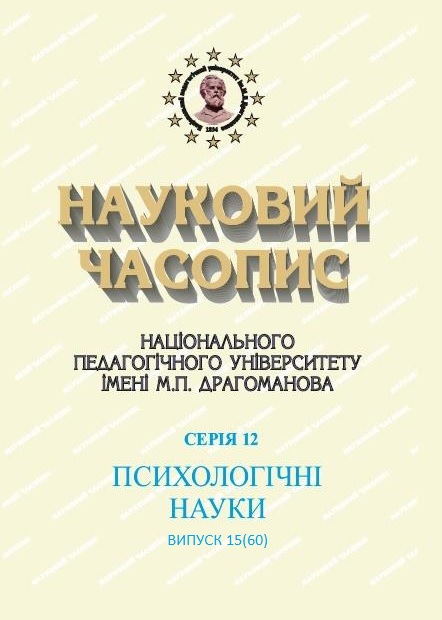GENDER FEATURES OF SOCIAL CREATIVITY AT FUTURE MASTERS OF PEDAGOGICAL SPECIALTIES
DOI:
https://doi.org/10.31392/NPU-nc.series12.2021.15(60).05Keywords:
social creativity, creativity, communication, future teacher, gender differences.Abstract
The article reveals the social creativity gender features at future masters of pedagogical specialties. Research methods: theoretical (analysis and generalization of psychological studies results); empirical (method “Social Creativity” by Batarshev); mathematical statistics (determination of percentages, typical results of the variation series, variance, standard deviation, Mann-Whitney test). It was described three approaches to social creativity interpretation (as a phenomenon of intergroup comparison, as one of the types of creativity, as person’s ability to effectively construction of non-standard communicative situations). It was shown that teacher’s social creativity is a component of his (her) professional creativity, a professionally important quality, because pedagogue’s competence includes the construction of educational (and other types of) communication, the settlement of non-standard communicative situations. It was established that most future teachers have average and higher levels of social creativity, which will allow them to perform their professional functions effectively. Statistically significant gender differences were identified on four of the eighteen scales of social creativity. Boys have a higher self-esteem of their resoluteness; the ability to demand and persist in order to people keep their promises; ability to do things that others perceive as unexpected and absolutely new. Girls are more likely to take responsibility for solving the most difficult problems and cases. The answers of both girls and boys have a normal distribution, in the mens’ subsample they are more contrasting, boys differ deeper in their social creativity manifestations. It was found that the most important task in future teachers’ social creativity formation is the development of their ability to transform goals and objectives accordingly with its achievement conditions, the ability to refine and improve initial projects and ideas in the process of its implementation.
Referenses
- Antiukhova, N.I. (2015). Kontseptualna model tvorchoho potentsialu maibutnoho vchytelia inozemnykh mov [Conceptual model of foreign language future teacher’s creative potential]. Humanitarnyi visnyk DVNZ “Pereiaslav-Khmelnytskyi derzhavnyi pedahohichnyi universytet imeni Hryhoriia Skovorody”. Tematychnyi vypusk “Mizhnarodni Chelpanivski psykholoho-pedahohichni chytannia”, 7–14 [in Ukrainian].
- Ball, H.O., Zlyvkov, V.L., Kopylov, S.O., Kurhanska, L.O. & Mykhailiuk, L.M. (2011). Pedahohichna komunikatsiia ta identychnist pedahoha [Pedagogical communication and teacher’s identity]. Kyiv : Pedahohichna dumka [in Ukrainian].
- Batarshev, A.V. (2005). Bazovye psykholohycheskye svoistva y professyonalnoe samoopredelenye lychnosty: Praktycheskoe rukovodstvo po psykholohycheskoi dyahnostyke [Basic psychological properties and professional self-determination: A practical guide to psychological diagnosis]. Saint Petersburg : Rech, 208 [in Russian].
- Dutkevych, T.V. (2021). Psykholohiia konfliktnosti studentiv pedahohichnykh spetsialnostei [Psychology of conflict at pedagogical specialties students]. Kyiv : KNT, 240 [in Ukrainian].
- Kahan, M.S., & Эtkynd, A.M. (1988). Obshchenye kak tsennost y kak tvorchestvo [Communication as a value and as creativity]. Voprosy psykholohyy – Psychology issues, 4, 25–34 [in Russian].
- Lazariev, M.O. (2011). Tvorchist yak rodova vlastyvist liudyny i osnova pedahohichnoi diialnosti [Creativity as a human generic attribute and the basis of pedagogical activity]. In: A.A. Sbruieva, O.V. Yeremenko, & O.V. Mykhailychenko et al. (Eds.). Pedahohichni nauky: teoriia, istoriia, innovatsiini tekhnolohii – Pedagogical sciences: theory, history, innovative technologies, 3(13), 93–105 [in Ukrainian].
- Moliako, V.A. (1983). Psykholohyia reshenyia shkolnykamy tvorcheskykh zadach [Psychology of schoolchildren’s creative problems solving]. Kyiv : Radianska shkola [in Ukrainian].
- Moliako, V.A. (2007). Tvorcheskaia konstruktolohyia (prolehomeny) [Creative constructology (prolegomenos)]. Kyiv : “Osvita Ukrainy” [in Ukrainian].
- Popel, A.A. (2014). Sotsyalnaia kreatyvnost: novye podkhody k konstruyrovanyiu poniatyia [Social creativity: new approaches to concept construction]. Vestnyk Nyzhehorodskoho unyversyteta imeni N.Y. Lobachevskoho. Sotsyalnye nauky – Bulletin of the Nizhny Novgorod University named after N.I. Lobachevsky. Social sciencies, 3(35), 129–135 [in Russian].
- Savrasov, M., & Aleksandrov, K. (2019). Sotsialna kreatyvnist u strukturi tvorchykh zdibnostei maibutnoho pedahoha [Social creativity in the structure of creative abilities of the future teacher]. Profesionalizm pedahoha: teoretychni y metodychni aspekty – Teacher professionalism: theoretical and methodological aspects, 9, 105–115 [in Ukrainian].
- Sannykova, O.P., & Belousova, R.V. (2001). Otsenka pokazatelei kommunykatyvnoi kreatyvnosty s pomoshchiu oryhynalnoi metodyky [Communicative creativity indicators evaluation by original methodology using]. Nauka i osvita – Science and education, 6, 52–54 [in Russian].
- Sysoieva, S.O. (2014). Tvorchyi rozvytok fakhivtsiv v umovakh mahistratury [Specialists’ creative development in the conditions of a magistracy]. Kyiv : Edelveis [in Ukrainian].
- Amabile, Т.М. (1983). The social psychology of creativity. New York : Springer-Verlag.
- APA Dictionary of Psychology. Electronic resource. Access mode: https://dictionary.apa.org/social-creativity
- Chikszentmihalyi, (1988). Society, culture and person: A system view of creativity. The nature of creativity. In R. Sternberg & T. Tardif (Eds.). (pp. 325–339). Cambridge : Cambridge Press.
- Maarten Johannes van Bezouw, Jojanneke van der Toorn, & Julia Christina Becker (2020). Social creativity: Reviving a social identity approach to social stability. European Journal of Social Psychology, 1–14. https://doi.org/10.1002/ejsp.2732
- Tajfel, H., & Turner, J.C. (1979). An integrative theory of intergroup conflict. The soсial psychology of intergroup relations. In W.G.Austin & S.Worchel (Eds.), (pp. 33–47) Brooks/Cole.

